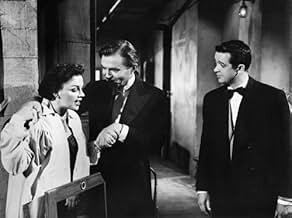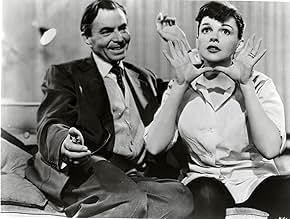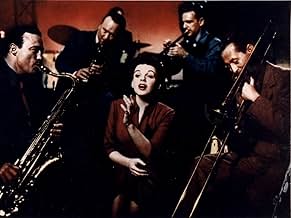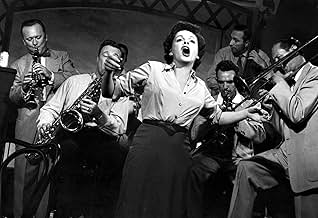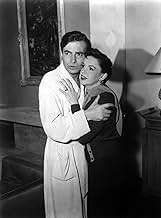AVALIAÇÃO DA IMDb
7,5/10
20 mil
SUA AVALIAÇÃO
Uma estrela de cinema ajuda uma jovem cantora e atriz a encontrar a fama, mesmo quando a idade e o alcoolismo enviam sua própria carreira para o abismo.Uma estrela de cinema ajuda uma jovem cantora e atriz a encontrar a fama, mesmo quando a idade e o alcoolismo enviam sua própria carreira para o abismo.Uma estrela de cinema ajuda uma jovem cantora e atriz a encontrar a fama, mesmo quando a idade e o alcoolismo enviam sua própria carreira para o abismo.
- Indicado a 6 Oscars
- 7 vitórias e 14 indicações no total
Tommy Noonan
- Danny McGuire
- (as Tom Noonan)
John Alban
- Academy Awards Attendee
- (não creditado)
Laurindo Almeida
- Guitarist
- (não creditado)
Leon Alton
- Usher
- (não creditado)
Rudolph Anders
- Mr. Ettinger
- (não creditado)
David Armstrong
- Soundman
- (não creditado)
Phil Arnold
- Agent #3
- (não creditado)
Nadine Ashdown
- Esther - Age 6
- (não creditado)
Gertrude Astor
- Racetrack Spectator
- (não creditado)
Avaliação em destaque
Is it possible to watch this fictional story without digressing to thoughts about the real life story of Judy Garland? For me it isn't. Both are permanently intertwined. And it's not just the parallel between fiction and fact, but also the dark, brooding, melancholy mood they engender, like ghosts calling out to us from a Hollywood that no longer exists.
The film's storyline is well known. I won't belabor it here, except to say that it communicates an honest and introspective indictment of the entertainment industry as it once was. The story can be thought of as a kind of archetypal Hollywood memoir, expressed as a musical.
But musicals are supposed to be upbeat, lighthearted, fun. This one isn't. Moments of humor and joy are swept away in a cascade of emotional pain and tragedy. Fiction mimics real life. How appropriate that the film's signature song "The Man That Got Away" is one that is so uncompromisingly serious, poignant, and smoldering ... a perfect vehicle for Judy Garland.
Some say she had the greatest singing voice of any entertainer in the twentieth century. This film lends credence to that assertion. Every song she sings is performed with such consummate verve, such emotional commitment that she seems to be singing not just for her contemporaries, but also for generations to come. Indeed, she is. My personal favorite is the "Born In A Trunk" segment, all fifteen minutes of it. Surrounded by sets of true cinematic art, she belts out one tune after another, including, of course, the poignant "Melancholy Baby".
Judy's singing and the music itself are what make the movie so memorable. But she also demonstrates her considerable acting talent. And the acting of other cast members is fine, especially the performances of James Mason and Jack Carson. I do think that the film was, and still is, too long, the result of an overly ambitious screenplay.
That Judy Garland was denied the Best Actress Oscar is poignant. But her talent was so massive, her uniqueness was so special, maybe fate required a compensatory level of pain and tragedy, as a prerequisite of legend.
The film's storyline is well known. I won't belabor it here, except to say that it communicates an honest and introspective indictment of the entertainment industry as it once was. The story can be thought of as a kind of archetypal Hollywood memoir, expressed as a musical.
But musicals are supposed to be upbeat, lighthearted, fun. This one isn't. Moments of humor and joy are swept away in a cascade of emotional pain and tragedy. Fiction mimics real life. How appropriate that the film's signature song "The Man That Got Away" is one that is so uncompromisingly serious, poignant, and smoldering ... a perfect vehicle for Judy Garland.
Some say she had the greatest singing voice of any entertainer in the twentieth century. This film lends credence to that assertion. Every song she sings is performed with such consummate verve, such emotional commitment that she seems to be singing not just for her contemporaries, but also for generations to come. Indeed, she is. My personal favorite is the "Born In A Trunk" segment, all fifteen minutes of it. Surrounded by sets of true cinematic art, she belts out one tune after another, including, of course, the poignant "Melancholy Baby".
Judy's singing and the music itself are what make the movie so memorable. But she also demonstrates her considerable acting talent. And the acting of other cast members is fine, especially the performances of James Mason and Jack Carson. I do think that the film was, and still is, too long, the result of an overly ambitious screenplay.
That Judy Garland was denied the Best Actress Oscar is poignant. But her talent was so massive, her uniqueness was so special, maybe fate required a compensatory level of pain and tragedy, as a prerequisite of legend.
- Lechuguilla
- 17 de jan. de 2005
- Link permanente
Enredo
Você sabia?
- CuriosidadesGeorge Cukor offered Marlon Brando the role of Norman Maine on the set of Júlio César (1953). "Why would you come to me?" asked Brando. "I'm in the prime of my life... If you're looking around for some actor to play an alcoholic has-been, he's sitting right over there"- pointing at his costar James Mason, who got the part.
- Erros de gravaçãoAfter Vicki comes home and she performs in her house for Norman, the doorbell rings and he goes to the door to accept a package for Vicki. His hair is all mussed-up when he goes to the door, but after he closes it and the camera goes back to him, there isn't a hair out of place. Then he walks over to where Vicki is and his hair is all mussed-up again.
- Citações
[last lines]
Vicki Lester: Hello, everybody. This is Mrs. Norman Maine.
- Versões alternativasContrary to popular belief, the film was not originally at 181 minutes, but rather 196 (3hrs. and 16mins.) at a post-premiere shown on August 8, 1954 in Huntington Park, California. After its second post-premiere - the very next day - two scenes of 15 minutes total were deleted; making the film run its original world debut length at 181 minutes. One was a number called "When My Sugar Walks Down the Street" that came after Judy's take of "I'll Get By" in the 'Born in the Trunk' sequence, the other was a scene where Garland and James Mason's characters (Vicki and Norman) were picnicking on the beach; production stills and promotional advertisements are the only thing left in existence of the footage. After its world premiere on September 29, 1954, 27 minutes was cut, bringing it down to a mediocre 154 time length. Those scenes were:
- 1) Esther quitting the band
- 2) The Trinidad Coconut Oil Shampoo
- 3) Esther working at a drive-in
- 4) Norman being driven away drunk in his car
- 5) Norman inquiring Esther's old landlady
- 6) Spotting Esther on the TV commercial
- 7) Tracking down Esther at her new boarding residence
- 8) Driving down the strip - Esther getting sick
- 9) "Here's What I'm Here For" musical number - Norman proposes
- 10) "Lose That Long Face" musical number - Vicki breaks down
- ConexõesFeatured in Film Night: Special: Forty Years in Hollywood (1970)
- Trilhas sonorasGotta Have Me Go with You
(uncredited)
Music by Harold Arlen
Lyrics by Ira Gershwin
Performed by Judy Garland with Jack Harmon & Don McKay
Principais escolhas
Faça login para avaliar e ver a lista de recomendações personalizadas
Detalhes
- Data de lançamento
- País de origem
- Idioma
- Também conhecido como
- A Star Is Born
- Locações de filme
- Church of the Good Shepherd - 505 North Bedford Drive, Beverly Hills, Califórnia, EUA(Norman Maine's funeral)
- Empresa de produção
- Consulte mais créditos da empresa na IMDbPro
Bilheteria
- Orçamento
- US$ 5.019.770 (estimativa)
- Faturamento bruto nos EUA e Canadá
- US$ 4.335.968
- Faturamento bruto mundial
- US$ 4.349.352
- Tempo de duração2 horas 34 minutos
- Proporção
- 2.55 : 1
Contribua para esta página
Sugerir uma alteração ou adicionar conteúdo ausente

























